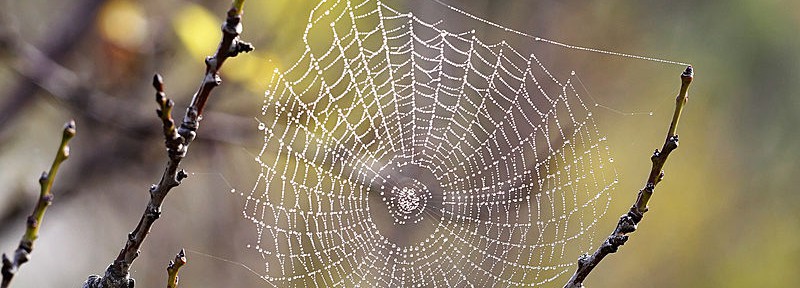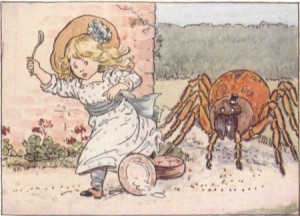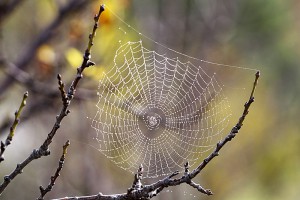
This past month has certainly been busy; settling in to the trainee position has taken some time, and there is still plenty to get my head around, but time has passed quickly and I have already learned much. For this blog post, I would like to focus in on one particular aspect of the training so far which has intrigued me. As many bugs are still hibernating and waiting to emerge, I have taken some time to learn a little about them before I meet them. I have been learning of the life histories and folklore of some of our best known British invertebrates; what follows is a reflection on one particular group of Arachnids, the often despised spiders.
 The word ‘spider’ comes from the Old English spinnan meaning ‘spinner’, a word which mutated to spither and then, finally, ‘spider’. Some of the earliest folklore concerning Spiders comes from Greek mythology; the young woman Arachne was taught to weave masterfully by the goddess Athene, but in a contest between the two of them Arachne angered Athene and was eventually turned into a spider as punishment. As spider folklore developed, it was common for them to be seen to bestow good luck or protection on people. To find one running across your path or crawling on your clothes was fortunate indeed. A spider on your clothes could be interpreted as a proposition for it to weave you new clothes. It is easy to see how this proposition to weave you new clothes could soon turn in to an offer of cash, hence the name Money Spider.
The word ‘spider’ comes from the Old English spinnan meaning ‘spinner’, a word which mutated to spither and then, finally, ‘spider’. Some of the earliest folklore concerning Spiders comes from Greek mythology; the young woman Arachne was taught to weave masterfully by the goddess Athene, but in a contest between the two of them Arachne angered Athene and was eventually turned into a spider as punishment. As spider folklore developed, it was common for them to be seen to bestow good luck or protection on people. To find one running across your path or crawling on your clothes was fortunate indeed. A spider on your clothes could be interpreted as a proposition for it to weave you new clothes. It is easy to see how this proposition to weave you new clothes could soon turn in to an offer of cash, hence the name Money Spider.
Many cultures also view spiders as symbols of persistence and patience; their webs are so fragile and are regularly destroyed in a world which contains so many larger animals. Their steadfast determination to keep on building webs whenever they get broken has led some peoples to appreciate their steady, hard work. Indeed, Robert the Bruce was inspired by a spider while he reflected in a cave, the spider’s persistence inspired him to try again and defeat the English.
Over the generations there have been various folk remedies involving spiders, a number of which were given by Thomas Muffet (the real life step-father and Arachnophile of Little Miss Muffet). Among them was a remedy to prevent the running of eyes by making eyedrops from the dung and urine of spiders, combined with rose oil. The ancient Greeks used cobwebs to staunch wounds and absorb blood.
There is, of course, a darker side to spiders in folklore. Their predilection for stalking has sometimes given them a bad reputation. Their webs are, after all, a trap; a devious and unseen horror for unsuspecting victims. Worse still, they wait for victims and then inject them with poison. This is construed by some cultures, such as ours, as an underhand tactic to catch prey. The females’ habit of sometimes killing males after mating has also been construed as nefarious. Such habits have led us to often construe spiders a dark and evil force; indeed, Carl Jung thought that spiders in nightmares were a sign of unconscious obsessions with suicide
The fear of spiders, Arachnophobia, is common enough in Britain. Interestingly, there appears to be more sufferers of this phobia here than in places where there are large and dangerous spiders. In the UK there is more danger from bees, wasps and horseflies. In some places where there are huge spiders, such as Amazonia and Papua New guinea, such fears are sometimes replaced with the desire to capture and eat certain large, nutritious species.
A few pieces of interesting spider information:
- A good trick to see a spider is to tickle a new and fresh looking web with a grass leaf, it will bring the spider out thinking it has caught prey.
- Spiders are the most numerous group of the Arachnida, which also contains ticks, mites, harvestmen and scorpions.
- All spiders are carnivores and kill prey with venomous bites.
- Spiders are clean and fastidious animals.
- Some web spinning spiders, like the Garden Orb Web Spiders, can make their webs in under an hour. A typical orb web contains some 20-60 metres of silk, yet weighs no more than a milligram.
- It is NOT true that you unknowingly swallow five spiders in your sleep each year!
For more information on spiders and many other invertebrates see the fantastic Bugs Britannica, Marren, P. and Mabey, R., (2010). Chatto & Windus: London.


